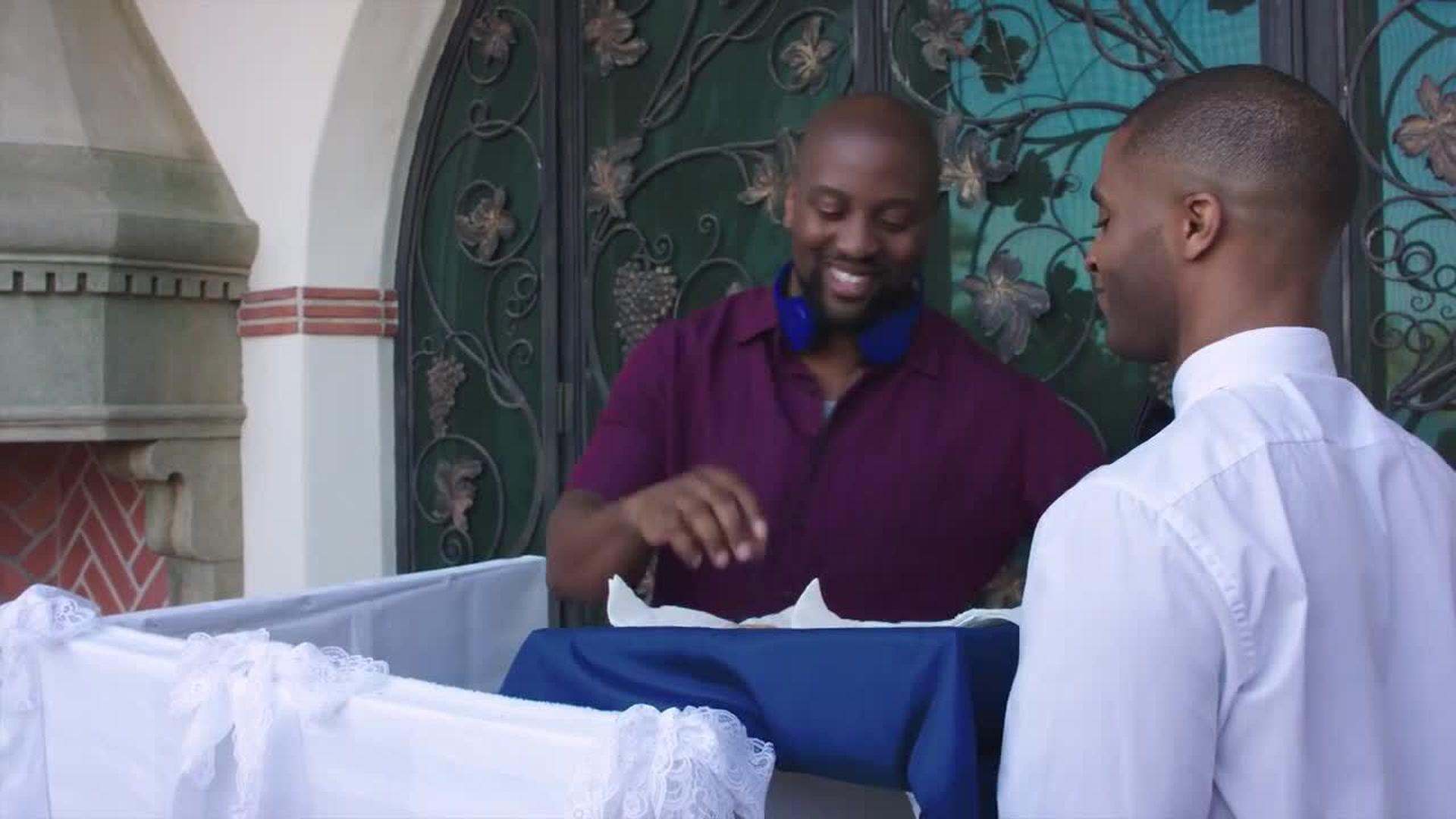All of Shakespeare's comedies end with a wedding, so I suppose that it's just as well that we end Here TV's Falling for Angels with one. "Malibu" isn't too serious, and that's alright. Twenty-some minutes of fluff with a heart is better than 20 minutes at work for a lot of people.
It is curious, however, to culminate a season of standalone episodes with one where all the characters meet. "Malibu" is a crossover with Now What?!, a Here TV web series detailing one man's experiences with post-sex pillowtalk. Protagonist Scott (Paul Galliano) here ties the knot with Levi (Joseph Michael Harris). There are no big issues tackled here, but it's good to see everybody happy and looking good once more.
Star (Diego Escobar), from "Silver Lake," makes an appearance, performing what we infer to be an overlong serenade. Brendon (Daniel Franzese) is hungover and in bed, but we learn that he and husband Jeffrey (Johnny Kostrey), the wedding planner, talked their relationship's problems out and have, in fact, opted to include Star within it.
Brendon's sister Karen (Calpernia Addams) is in charge of the cake, which had a mishap en route to the wedding. That uber-L.A. stereotype -- a detailed detailing of which roads were taken to go somewhere -- make a welcomed appearance. She manages to whip up a boozy trifle and saves the day.
Levi's brother is Chase (Jason London) of "Bel Air," who used his show-business connections to arrange for Alex Mapa, playing himself, to officiate. Bentley and Chase's marriage is finally on stronger footing; they planned this wedding and offer sage advice for the happy grooms. Abraham (Aaron D. Alexander), looking happier than he ever did in "Leimert Park," surfaces as the DJ; he and Terick (Blake Young-Fountain) are now officially boyfriends and work weddings to save up the money to move in together.
We learn that Steven (Steve Grand) from "Boyle Heights" was Terick's college professor. He and boyfriend Jesse (Luis Jose Lopez), who is Scott's attorney, have apparently overcome the latter's serial infidelity and come to an understated agreement to themselves get married. The leads from "Koreatown" make appearances: Kevin (Ty Chen) and Gino (Dale Song) are independently friends of each groom. Gino's time in Korea was everything he needed it to be. They catch up and walk hand-in-hand to go dance.
What we see of Malibu is the beach -- is there anything else to it? While I am not the kind of critic who would use the phrase "a love letter to Los Angeles," the City of Angels felt consistently there this season -- impressive for a show often set inside bedrooms and house parties. I associate California with bright blue skies, Mission Revivalism and mid-century Modernism, incredible diversity, and a level of physical attractiveness where the average is a good standard deviation prettier than the norm elsewhere. This is the world of Falling for Angels.
Chase leads a toast, "To Levi and Scott, and to all of us here who share and create our own family and our own love."
Centrally, Falling for Angels is about gay men and love. "Boyle Heights" covered unfaithfulness and interracial relationships. "Koreatown," my favorite episode, was about self-esteem and the singularly gay hookup experience. "Leimert Park" was about respect, for others and for oneself. "Bel Air" was about aging and the primacy of sex. "Silver Lake" was about communication, non-monogamy, and drunken gay hysterics.
While there is certainly more to say about gay men than how we love (to wit, check out FX's The Assassination of Gianni Versace: American Crime Story), I leave this season of Falling for Angels happy that a scatter-shot, light-but-affecting record of what it was like to be an urban gay man in this time exists. I am happy that gay men were protagonists and that the only straight characters were a requisite fruit fly and, importantly, a woman whose partner was cheating on her with another man.
Falling for Angels did not talk down to its audience in its handling of gay themes, and I appreciated the storylines' honesty about the kind of lives we live. We seem to be living in a time when having HIV is less stigmatized and certainly less dangerous than anytime before. Queer statistics are notoriously difficult to measure accuracy, but we are significantly less likely than straight people to be in monogamous relationships. Even in cosmopolitan Los Angeles, many men still live in the closet. Some are closeted for decades.
"Malibu" was co-written and -directed by David Millbern and Billy Clift. "We wanted to leave hope," Clift said. As much as Falling for Angels was about love, it was always about hope -- that things can get better if we work on them. Humans live their lives trying to find the people who make them whole. Gay men do this differently than others, but we do it for ourselves, and for each other. We are, ultimately, better together.
Watch the "Malibu" episode below:
















